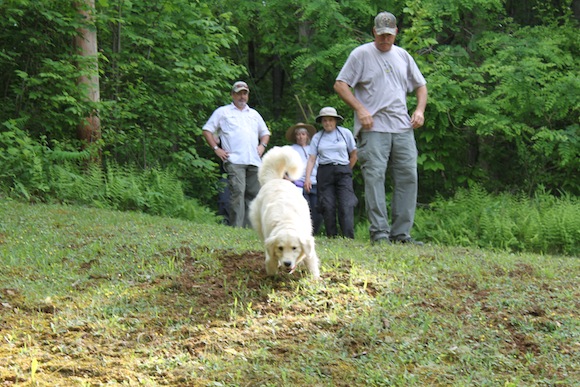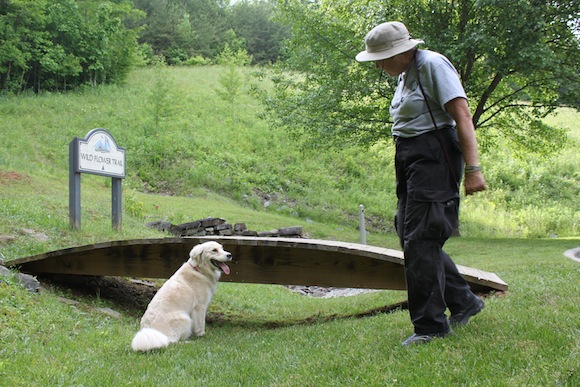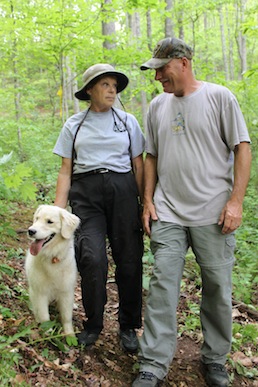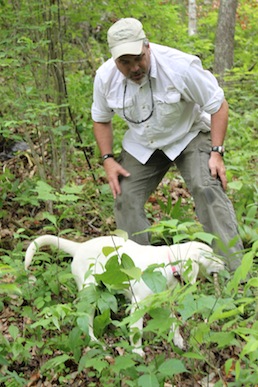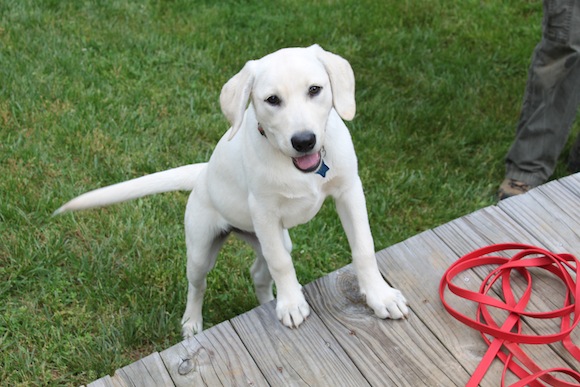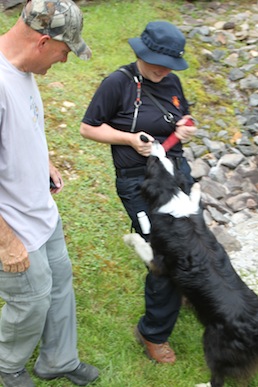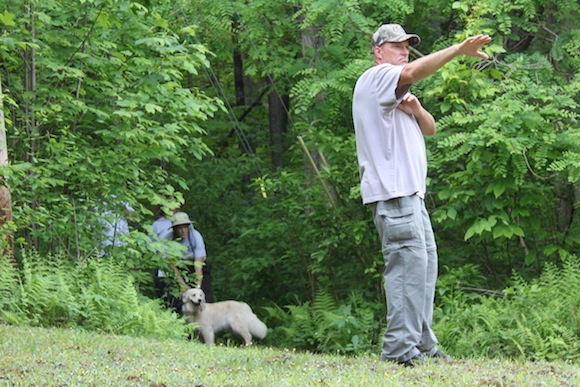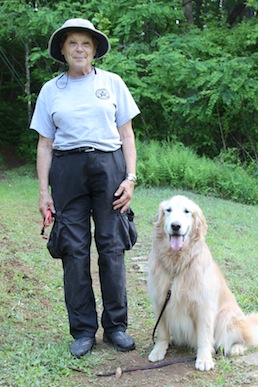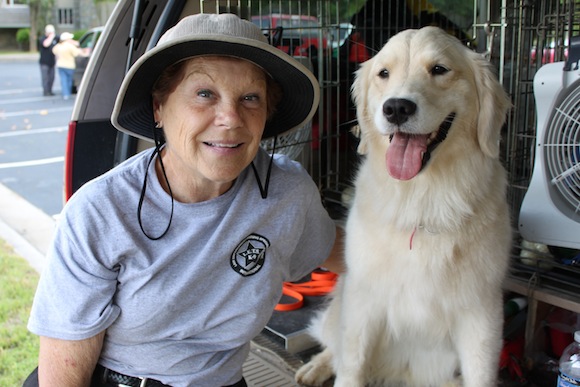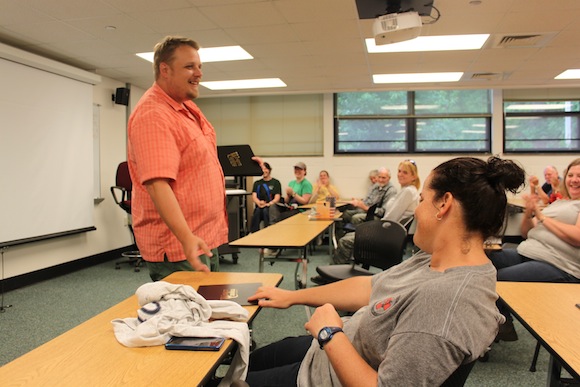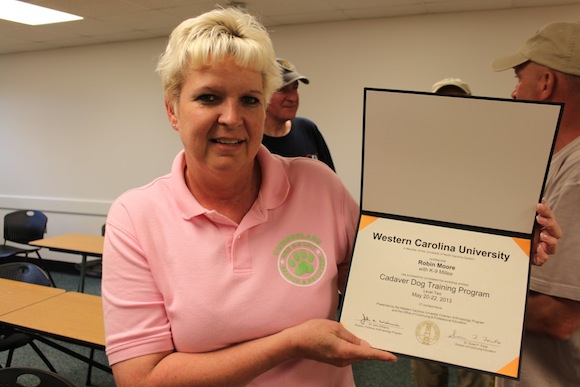The Western Carolina University Forensic Anthropology Program, in conjunction with the Division of Educational Outreach and the Human Identification Lab, hosted their latest cadaver dog training program workshop May 15 – 22.
Participants experienced instructional lectures as well as in-field exercises giving them and their canine companions valuable practice in human decomposition odor tracking and analysis.
Deputy Kathy Adamle, a canine handler at the Geauga County Sheriff’s Office in Chardon, Ohio, began training dogs in 1994 and has worked with cadaver dogs since 2002. She participated in the workshop at WCU with her newest puppy, Bridget. The cream-colored golden retriever got to learn the difference between human and deer bone for the first time.
“She did a good job. She’s learning,” Adamle said. “It’s not an overnight thing. It’s constant reinforcement, two or three times a week, and I have to work my other three.”
Adamle also brought Jake, who, at a nine years old, is already an experienced cadaver dog. “I brought him along so that he could work a couple scenarios just to keep him sharp,” Adamle said.
For centuries, law enforcement agencies and militaries around the world have utilized dogs to track scents because of their profound sense of smell, with approximately 220 million olfactory receptors in their noses compared to 5 million in those of humans. Dogs can determine the direction from which a scent is traveling thanks to highly sensitive skin receptors that allow them to feel the moisture on their noses being evaporated by air currents.
“It doesn’t matter what scent you teach the dog; cadaver, narcotics, bomb work, it doesn’t matter,” said Adamle. “It’s all a game to them. They don’t get depressed. All they want is their reward. They work for a paycheck.”
Paul Martin, a graduate of WCU’s forensic anthropology program, founded the university’s cadaver dog training program in 2011 and currently serves as its program coordinator. After handling his first dog in 1997, Martin has specialized in human remains detection and recovery with canines since 2000. He is currently working with his third, fourth and fifth cadaver dogs.
The WCU cadaver dog training program holds workshops every fall and spring, with each workshop divided into two courses. The level one course ran from May 15 – 17 with a $399 enrollment fee while the level two course took place May 20 – 22 at a cost of $449.
While open to anyone, the program is not intended for casual hobbyists but for professionals. Any dogs participating in the level one course must have had a minimum of six months prior training and must know their trained final response, what their handlers have trained them to do when they smell human decomposition and locate its strongest source. A cadaver dog’s trained final response is typically to bark, sit or lie down.
The level one course is designed to introduce handlers and their dogs to large sources of human decomposition odor that they may not have been exposed to before, such as a full body, as well as help them understand the decomposition process and scent movement throughout an environment.
The level two course involves a number of outdoor search scenarios designed to reinforce the dog’s trained final response to large sources of human decomposition odors. One of these involves the dogs locating graves in a cemetery along the Tuckaseegee River, where the handlers are also exposed to ground-penetrating radar technology.
Another scenario was set up by Brad Dennis, the director of search operations for the KlaasKIDS Foundation’s Search Center for Missing and Trafficked Children based out of Pensacola, Florida.
In Dennis’ real-world scenario, handlers and their dogs must traverse unfamiliar woodland terrain near the WCU campus, searching for hidden items that are imbued with the scent of human decomposition. While the dogs can detect the scents from far away, the goal of the course is for them to locate the source of the odors and grow accustomed to zeroing in on the largest quantity
“It’s really amazing to watch the progression that the dogs working that area make throughout the day,” Martin said, “from being a little bit hesitant and not wanting to give its full trained final response to, by the end of the day, offering those trained final responses without any prompting by the handler.”
Since offering the first cadaver dog training course at WCU in May 2011, Martin has received many letters from handlers who went on to conduct searches for human remains and make successful recoveries with their dogs.
“One handler in particular,” Martin recalled, “everybody on her team, the law enforcement that she worked with, they were just amazed how the dog actually took them all the way to the remains and gave that trained final response there at the remains.”
Greg Cole, a retired captain of the Gulf County Sheriff’s Office in Port St. Joe, Florida, has trained dogs for military and law enforcement since 1976. He began working with cadaver dogs about 13 years ago and served as an instructor in the WCU workshop this past week.
“I was honored to come out here and help at Western Carolina University,” said Cole. “Best cadaver dog training program in the country.”
